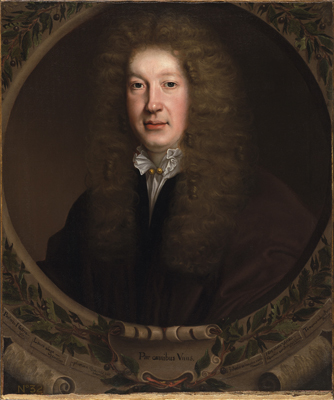by Susan Bertram
John Dryden was born in 1631 in a small town in Northamptonshire, England, the eldest of 14 children, and was considered one of the dominant and greatest poets in Restoration England, the period between 1660 and 1800. One of his maxims has provided many an English-speaking student endless moments of torment— the idea  that a sentence should never end with a preposition, because it was against the rules of Latin grammar. Oh, those stranded prepositions, of which we English speakers often end a sentence with!
that a sentence should never end with a preposition, because it was against the rules of Latin grammar. Oh, those stranded prepositions, of which we English speakers often end a sentence with!
Dryden’s first published verses were an elegy “Upon the Death of Lord Hastings” (1649). Dryden received a BA from Trinity College in Cambridge in 1654. He moved to London sometime around 1657, and upon the death of Lord Protector Cromwell wrote his “Heroic Stanzas’ (1659), which gained him some attention. During the Restoration, known as such due to the restoration of the English monarchy, theatres were reopened, and Dryden began writing plays. Although his first few plays were of little note, he established himself as a playwright with The Indian Emperor in 1665, after the King’s court had relocated to Oxford due to the plague raging through London.
Dryden saw success with his long poem Annus Mirabilis that commemorated both the naval war with the Dutch and the Great Fire of London, and he was honored with the position of Poet Laureate in 1668. The Archbishop of Canterbury also saw fit to bestow upon him the degree of M.A. in that same year. He soon gained favor with Charles II for his political satire on Monmouth and Shaftesbury entitled Absalom and Achitohel. Notably, Dryden had an interest in theology and published a long religious poem that argued for Christianity over Deism. The poem was A Layman’s Faith. His later conversion to Roman Catholicism and his allegorical fable, The Hind and the Panther, criticizing the Anglican Church, eventually cost him his laureateship when the Protestant, William III, was placed on the throne. He returned to the theatre and then eventually turned to translations and poetry. His bibliography reveals a man who was prolific in his writings of dramatic works, prose, poetry and satirical works as well as translations. Dryden died on April 30, 1700.
Happy the Man is sublime in its brevity in defining happiness. It’s a short poem as compared to many of the larger writings of Glorious John, as Walter Scott called him. Yet, it encompasses some eternal truths for personal happiness. What a fantastic line: “Not Heaven itself upon the past has power”—how many people spend valuable time worrying, regretting, fretting and wishing they could change the past? The things you’ve done or failed to do already can’t be changed, but the future is yours to shape. St. Paul himself in Philippians 3 stated “…but one thing I do, forgetting what lies behind and straining forward to what lies ahead, I press on toward the goal for the prize of the upward call of God…” this from a man who had once slaughtered Christians, but came to see his only hope in Jesus Christ! What drives you to a higher ideal?
Work toward living each day to the fullest and owning your disappointments and failures as much as your successes – “…fill the unforgiving minute with sixty seconds’ worth of distance run,” for a life that won’t leave you thinking only about the past, but rather always pushing on toward a brighter future.
Happy the Man
Happy the man, and happy he alone,
He who can call today his own:
He who, secure within, can say,
Tomorrow do thy worst, for I have lived today.
Be fair or foul or rain or shine,
The joys I have possessed, in spite of fate, are mine.
Not Heaven itself upon the past has power,
But what has been, has been, and I have had my hour.
Speak Your Mind
You must be logged in to post a comment.